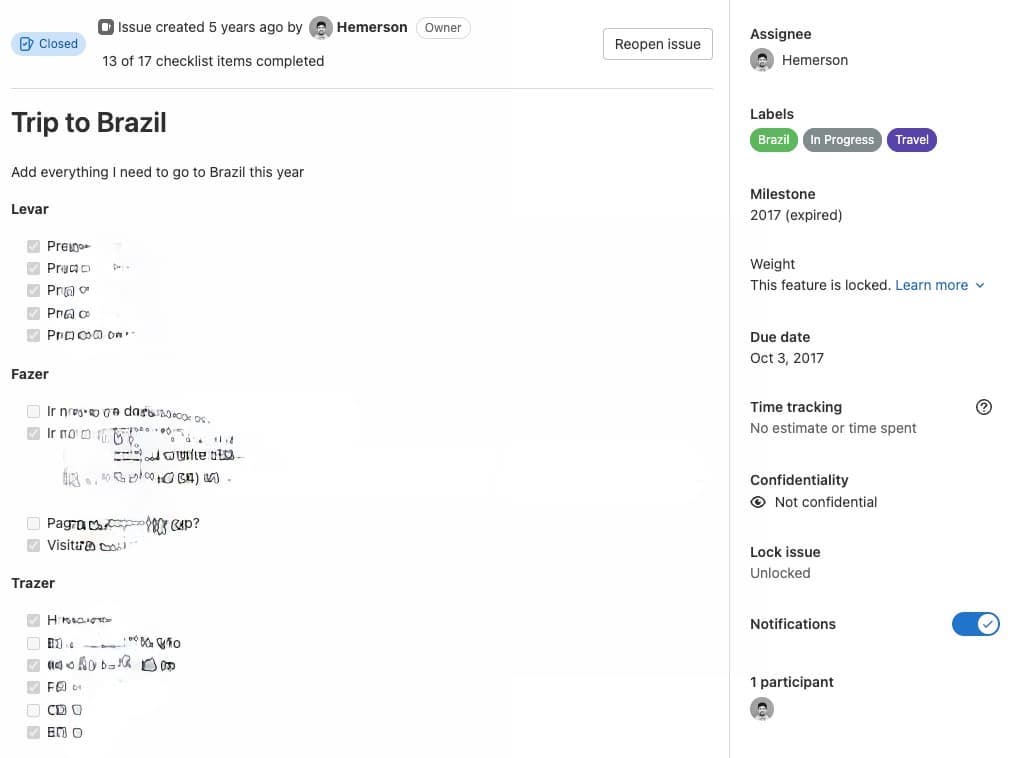My Second Brain
 Photo by Anete Lūsiņa
Photo by Anete LūsiņaIt’s been 5 years since I started to track everything in my life.
It all started with a private GitLab repository back in 2017 where I created “issues” to keep track of the things I needed to do: reminders, follow up stuff at work, whatever I was learning at the time, interview notes, private notes, books I’m reading and more.

I then moved everything over to GitHub in 2019 but kept the same process to "run my life" as I’d like to call it.
While on GitHub, I turned it into a SCRUM-based methodology, except that I was running it on my own and so I didn’t need to run stand up meetings with myself on a daily basis.
The process was very simple:
- One GitHub project for each calendar year.
- One GitHub issue for anything I need to do or remember.
- Each issue must:
- be assigned to me.
- have a label to make it easier for me to find, prioritise and groom later.
- be assigned to the current calendar year (the GitHub project created in the first step).
- Every week (my own sprints), I take a quick glance of all issues in the backlog and get stuff done.
- Iterate this process over and over.
Looking for new options
I have to say that this process works great for me and I rarely miss things in my life*. However, I’ve been finding time consuming having to create a GitHub issue for some of the "quick tasks" I needed to do.
Part of being productive is having a simple and quick system to capture information and GitHub was on my way to move faster.
I initially started to hack my own process by using a single issue for the week. And for any ad-hoc task, I’d just create a task list in markdown on the issue and take it from there. Needless to say that I didn’t like this approach.
I also didn’t like GitHub mobile and I found myself creating notes somewhere else first to later create a GitHub issue once I’m at my laptop.
*that’s not true according to my wife 😅.Discovering Notion
Notion was on my radar for quite some time now. But I guess I never gave the attention it deserves.
Only after reading about Building a Second Brain and watching a few YouTube videos I realised that my process is already my "second brain" and that I could do better with the way I handle my TODOs, how I keep a record of important milestones and how I keep my notes somewhere I have easy access to.
Alongside that, I started to look for alternatives to improve my capture process and a lot of apps came my way: todoist, Things, Microsoft To Do, Asana, Apple Notes, Apple Reminders, TickTick, Google Keep, AnyList, Trello…
It’s easy to get overwhelmed with so much input at the same time and give up. But my motivation was stronger so I decided to give Notion and Apple Reminders a shot.
The new process
My new process became simpler and more effective:
- if there’s something for me to do in less than 2 min, I do it immediately.
- otherwise, it becomes an entry in Apple reminders. I add a description when necessary, create a tag and add a due date if the task is time sensitive.
- In the morning, I check Apple Reminders to see if there’s anything I have to do (or could do) on that day.
- Throughout the day I also check Apple Reminders. I like to schedule some of my TODOs for the afternoon and opening this app during the day organically became a new habit.
- For long live information, like book tracking, notes, virtual archive, home operating stuff and even my own personal CRM system, I use Notion.
Conclusion
From the time I’m publishing this blog post, it’s been one month since I moved away from GitHub to run my life.
Notion is a great note taking app as well as a powerful tool to organise my second brain. I’m enjoying its database engine and I find it super helpful to create views so I have a quick glance of important information. I wish I could own the data and I can see this as a potential problem in the future.
Apple Reminders checks every box I was looking for in a TODO app:
- I can create TODOs on the go, easily.
- Integration between the mobile app and the macOS app is great!
- I can use tags and subtasks when necessary.
- I can set up reminders for some TODOs.
- Task prioritisation.
- Recurring tasks.
- Smart lists.
I hope that's helpful and interesting to you. 👋🏼
Did you know you can help me with this page?
If you see something wrong, think this page needs clarification, you found a typo or any other suggestion you might have feel free to open a PR and I will take care of the rest.
My entire site is available to edit on GitHub and all contributions are very welcome 🤙🏼.

Hemerson Carlin, also known as mersocarlin, is passionate and resourceful full-stack Software Engineer with 10+ years of experience focused on agile development, architecture and team building.
This is the space to share the things he likes, a couple of ideas and some of his work.


